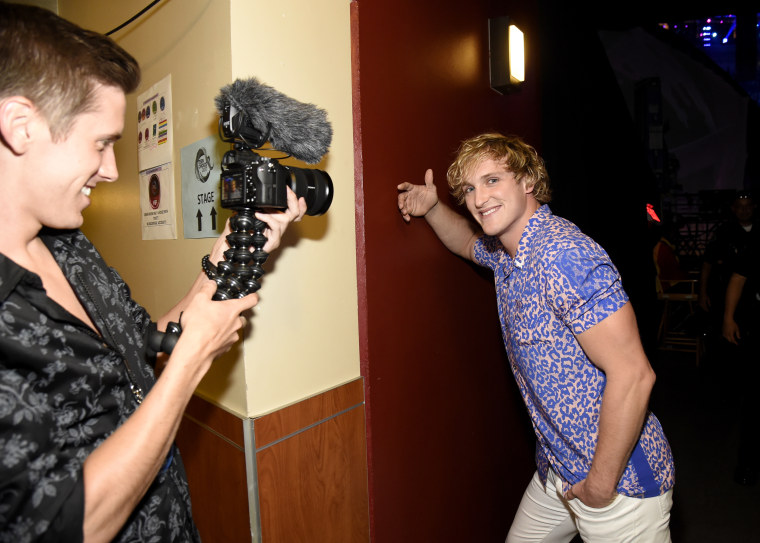In many ways, youth is an asset in YouTube's creator community.
As digital natives, people like Logan Paul (whose recent antics caused the company to suspend advertisements on his channel) and his cohort intuitively understand the workings of social media and online promotion; they’re also easily able to relate to the even younger audience that makes up YouTube’s most ardent viewers.
But it’s also a tremendous liability: Many, if not most, YouTubers are operating independently, without the vast management team that accompanies traditional celebrity. And few, if any, YouTubers have the skills to deftly manage their own public persona — especially when they’re still figuring out who they are and what they believe behind the scenes.
Take the story of Laci Green, a YouTube sex educator whose career took a sharp turn after a nasty brush with online harassment, to which "This American Life" devoted the first act of its show last weekend. Ostensibly, the piece is about disagreements within the sex positive left, and the destructive potential of call out culture and public shaming. But it’s also about what it means to be young, famous, and on YouTube.

Green was just 17 when she first started posting videos to YouTube; seven years later she had a million followers and an MTV web series. Her youth hardly makes her exceptional: More often than not, popular YouTubers are internet natives, barely able to remember a pre-internet era.
PewDiePie — a YouTuber known for his video game commentary and often offensive humor — is just six days younger than Green; beauty vlogger Zoella is 27; and the aforementioned Paul, whose ill advised trip through Japan made headlines earlier this year and was the start of his new financial difficulties, is just 22.
Writer Lauren Duca, who shot to fame after an essay for Teen Vogue went viral, has been upfront about the struggles of coming of age on a public stage. “Quick reminder that I am 26-years-old, and learning in public, and trying my best, but also never promised to be fucking perfect. Xoxo!!!” she tweeted last fall.
It’s a sentiment that seems applicable to Green as well: After suffering extensive harassment for her sex ed work, Green switched lanes. These days, her videos aren’t enthusiastic lectures about sex, but tentative ventures into hot button discussions about gender identity and sexual orientation, with Green making clear that she’s still sorting through these topics herself, trying to figure out where exactly she lands.
There’s nothing new about young celebrities exploring their identities and ideas in public, but it’s hard to deny that our attitudes towards these explorations have changed.
There’s nothing new about young celebrities exploring their identities and ideas in public, but it’s hard to deny that our attitudes towards these explorations have changed. When Britney Spears had her meltdown in 2007, there was a sense that something had gone wrong, that the system that was put in place to protect her had failed to adequately do its job. (Notably, a court agreed, and appointed conservators for her in 2008. The order remains in effect.) But when a social media star publicly loses it, however, it’s just business as usual for the machine. (Tellingly, it was a tear-filled defense of Britney that initially launched Chris Crocker to fame.)
The problem that’s baked into YouTube is that young "creators" are financially rewarded for attracting attention, without anyone providing guidance on how to manage that attention once they’ve gotten it. In Hollywood, it’s hard to make it big without acquiring a manager, an agent, a PR person and then some. In YouTube Land, all you need is yourself, a camera, and an internet connection — equipment that’s hardly likely to be a voice of reason when you’re considering posting something that maybe you shouldn’t.
The problem that’s baked into YouTube is that young "creators" are financially rewarded for attracting attention, without anyone providing guidance on how to manage that attention once they’ve gotten it.
Navigating the fine line of attracting a ton of attention for only the right reasons is likely to get more difficult if there aren't some serious changes to the business of doing show business online. The (theoretical) democracy of YouTube, where anyone can become a star if they’ve got enough talent, however loosely defined, certainly seems like a nice idea. But if it comes with a human cost, it’s worth looking into installing some guardrails.
What might those guardrails look like? YouTube could consider taking responsibility for its more famous creators: Providing support, guidance and privacy protection for the people whose efforts are generating income for the company. It could consider creating tutorials for all YouTubers, explaining the ins and outs of navigating online fame, and doing its best to prepare users for the difficulties of navigating success online. On a fundamental level, it could stop seeing itself as an open marketplace for video content, and start considering that, in many ways, it’s a broadcast network that owes its talent more guidance — and guidelines — than it has historically provided.
But that, of course, would require YouTube to actually accept responsibility for user-uploaded content; as a result, it seems unlikely to happen.
The promise of the internet has always been that anyone can say or do whatever they want, with little to no restriction placed on content. But as that freedom rockets young people to mega-stardom, it also becomes a kind of curse. Young people assuming that attention itself is a measure of the value of one’s work isn’t anything new. What’s different is that there are no longer any adults around to tell them any different.
Lux Alptraum is a Development Producer for Fusion’s "Sex.Right.Now." and the author of "Faking It," an examination of our obsession with female dishonesty, out in fall 2018 from Seal Press.
